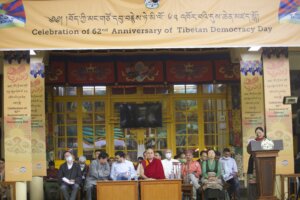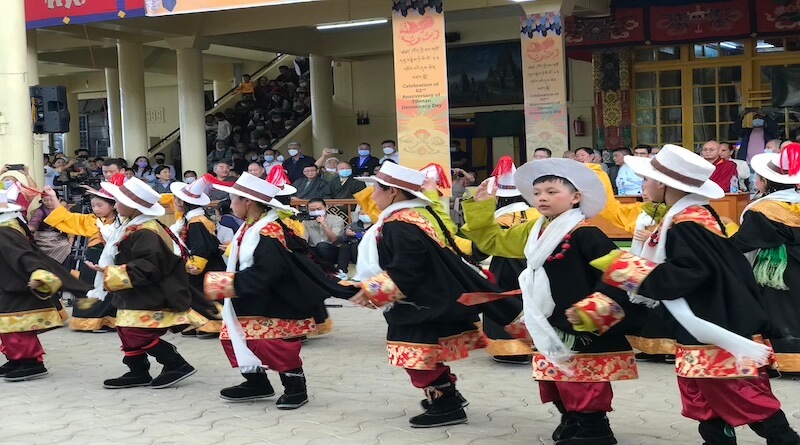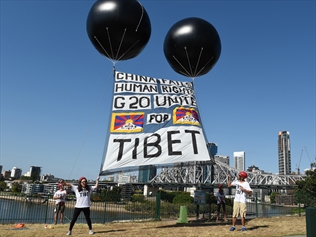Tibetans in Dharamsala celebrate 62nd Tibetan Democracy day

DHARAMSALA, 2 Sept: Hundreds of Tibetans and supporters gathered at the courtyard of the main temple in Mcleod Ganj, Dharamsala today to participate in the official celebrations of the 62nd Tibetan Democracy day.
The event was attended by among others, Vishal Nehria, BJP’s MLA from Dharamshala as the Chief Guest along with the representatives of the three pillars of the Tibetan democracy as well as the members of Tibetan Parliament-in-exile and officials of the Central Tibetan Administration (CTA).
“The democratic system, while in exile, is the strength and the driving force of our movement and it will also be the most precious gift to our Tibetan brethren when we are reunited”, the officiating President of the CTA Education Minister Tharlam Dolma Changra said at the official celebrations of the 62nd Tibetan Democracy day.
She further said that “over the past sixty years, our commitment and ability to follow and make sound development of the democratic system has been the cornerstone of our remarkable achievement in furthering the cause of Tibet and developing a successful Tibetan community in exile” as she delivered the statement of the Kashag(cabinet).
The CTA Cabinet further expressed concern over the outbreak of COVID-19 and natural calamities inside Tibet and called out China for “the extreme disease preventive measures have affected the normal life and livelihood of Tibetans.”
“We appeal to our Tibetan brothers and sisters in Tibet to exercise social distancing and preventive measures, and also recite the mantra of Tara as per divination.”
We would like to thank Representative Jim McGovern and Representative Michael McCaul of the U.S. Congress for introducing “the Promoting a Resolution to the Tibet-China Conflict Act on 13 July 2022”. It not only conforms to the Central Tibetan Administration’s Middle-Way policy but also helps to give leverage to our efforts to resolve the Sino-Tibet conflict through dialogue. We will continue to make efforts to encourage like-minded countries in Europe to do the same.
The Speaker of the Tibetan Parliament-in-Exile, Khenpo Sonam Tenphel while delivering the statement of the parliament declared that “among all the communities of people living as refugees in exile, the Tibetan community stands out as one that is run under a democratic system.”
He further described “the governance system of the Central Tibetan Administration” as “one that is fully democratic in all facets of its functioning. It has all the characteristics of being able to stand shoulder-to-shoulder with any other genuine democratic system in this world.”
The officiating President and the Speaker both paid their deepest respect and gratitude to His Holiness the Dalai Lama for pioneering and tirelessly steering a democratic system for the well-being of the Tibetan people.
Vishal Nehria, BJP’s MLA from Dharamshala declared the occasion a special day for the Tibetans and expressed his delight at being invited as the Chief Guest on Tibetan democracy day.
He further credited the Tibetan spiritual leader His Holiness the Dalai Lama for making Dharamsala a tourist hub both domestically and internationally and commended the harmony between Tibetans and the local Indian community.
He also applauded Tibetans for preserving their culture and declared that culture is the most important aspect of a nation.
Cultural performances were presented during the event and winners of the coveted Sikyong Award for Academic Accomplishment, Gandhen Phodrang scholarships, class 10 Sikyong Excellence award, Sikyong Professional Scholarship award and CTA Award to Distinctive Staff for 25 years of service and winners were presented with their awards, certificates and cash prizes.
On 2 September 1960, the first Commission of Tibetan People’s Deputies from religious and provincial constituencies took their oath before His Holiness the Dalai Lama, thereby, formally inaugurating the Tibetan democratic system of governance.
The Dalai Lama devolved all his political authority to a democratically elected leader despite the impassioned appeals by the Parliament and the Tibetan people to stay on as the nominal head of state in 2011, thereby completing the transition to a secular democracy. This year marks over 10 years since the devolution of political authority by His Holiness.






